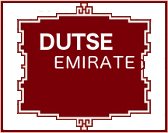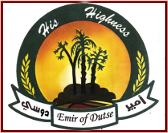On the basis of the numerous Jigawa State Government edicts, which spelt out duties and responsibilities of emirate councils, Dutse Emirate Council to the great admiration of many discharges among others the following functions: -
A. Conflict Resolution. The Emirate council’s main responsibility is the resolution of disputes arising from civil cases of Land matters and Islamic personal law.(albeit with no judicial power). The Emirate council receives and disposes cases on a daily basis, unless there is insufficient evidence to conclude the case. The council’s main objective is achieving reconciliation and peaceful coexistence among its subjects. Many a times ordinary people prefer to refer their cases to the Traditional court [Emirate council] than to a common law court. This is due to its relative ease to which judgment is obtained. Besides it is cheap and affordable to low income earners.
B. Advisory. Due to the traditionally inherent non partisan nature of the institution, the Emirate Council at best renders advisory role to the State Government in matters of security, culture and peoples welfare.
C. Zakkat and Da’awah. With the advent of the Fourth Republic civilian regime in 1999 and its deliberate pursuance of the establishment Sharia legal system in Jigawa State: Zakkat administration became a state policy of poverty reduction through the mechanism of Zakkat [re-distribution of wealth from the rich to the needy]. Dutse Emirate Council was saddled with the arduous responsibility of ensuring its successful implementation. To this effect, the emirate Council vigorously commits its energy to the realization of this noble cause.
As a first step, a general policy and co-ordination committees at local government and district levels were established; while committees on assessment, collection and distribution were established at village and ward levels. Moreover, Da’awah and enlightenment campaigns were given top priority as prominent Ulama were given special role in the committees set up at all levels to carry out the Da’awah works.
The zeal, energy and commitment devoted to this cause are evidenced by the phenomenal successes recorded over the past three years. In the three year period, collection have almost tripled i.e. from N27 million collected in [1421 AH] to N57 million in [1422 AH] and to over N80 million in [1423 AH].
The distribution of Zakkah particularly in the countryside has considerably reduced rural-urban migration during the dry season and has considerably reduce the number of destitute on our streets.
The Success of Dutse Emirate Zakkat committees has become legendry in recent times as many Islamic organizations across the globe have sent in delegates or wrote to solicit for guidelines on the pathway to recording similar successes.


